from Apr. 25, 1865
Idaho Statesman, April 25, 1865.
-
Full Title
Idaho Statesman, April 25, 1865.
-
Description
This is an extra evening edition of the Idaho Statesmen published as soon as reports of the assassination reached the state. Reads, "The details, which we present to our readers in this extra, constitute a chapter of horrors that neither history nor fiction can parallel. The murder of Caesar by Brutus, the assassination of Henry the Fourth by Ravaignac, sink into insignificance when compared with the terrible daring and fearful coolness which characterizes the perpetration of these deeds."
-
Source
Idaho Historical Society
-
Rights
Use of this item for research, teaching and private study is permitted with proper citation and attribution, as defined here. Reproduction of this item for publication, broadcast or commercial use requires written permission.
-
Tags
-
Cite this Item
Idaho Statesman. "Idaho Statesman, April 25, 1865. ". Remembering Lincoln. Web. Accessed June 15, 2025. https://rememberinglincoln.fords.org/node/318
-
Creator
Idaho Statesman
-
Date
April 25, 1865
from Apr. 25, 1865
Idaho Statesman, April 25, 1865.
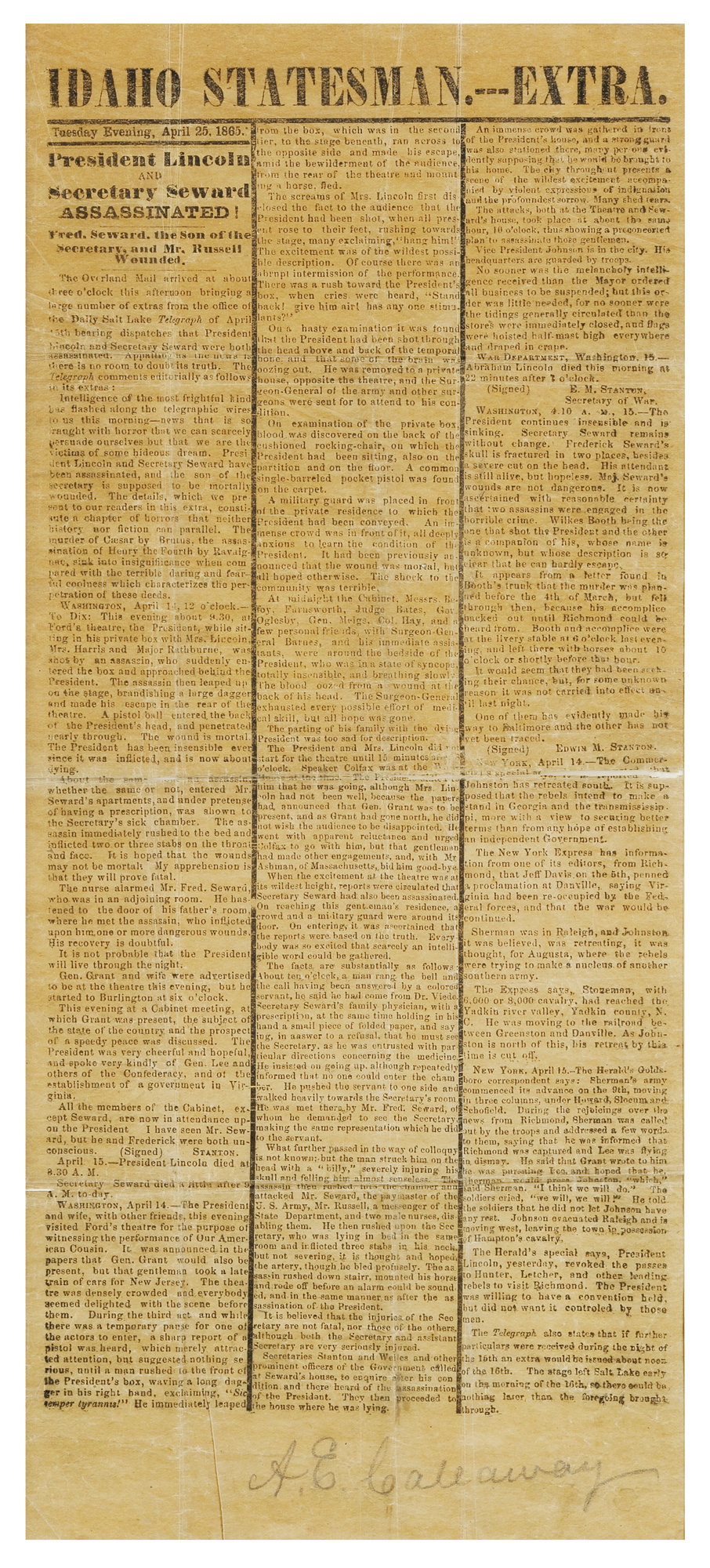
-
Description
This is an extra evening edition of the Idaho Statesmen published as soon as reports of the assassination reached the state. Reads, "The details, which we present to our readers in this extra, constitute a chapter of horrors that neither history nor fiction can parallel. The murder of Caesar by Brutus, the assassination of Henry the Fourth by Ravaignac, sink into insignificance when compared with the terrible daring and fearful coolness which characterizes the perpetration of these deeds."
-
Source
Idaho Historical Society
-
Rights
Use of this item for research, teaching and private study is permitted with proper citation and attribution, as defined here. Reproduction of this item for publication, broadcast or commercial use requires written permission.
-
Creator
Idaho Statesman
-
Date
April 25, 1865
from Jun. 1, 1865
The Friend, June 1, 1865
-
Full Title
The Friend, June 1, 1865
-
Description
The front page of The Friend newspaper published in Honolulu, Hawaii indicates the news of President Lincoln's assassination did not reach Hawaii until May 8, 1865. Information is provided on religious services, as well as the printing of "A Sermon on the Death of Abraham Lincoln" by Rev. S.C. Damon [Samuel Chenery Damon]. Known as "mourning rules," the wide vertical lines between the newspaper columns represent grief over the loss of an important person.
-
Source
HN-1865-010924
-
Rights
Use of this item for research, teaching, and private study is permitted with proper citation and attribution as follows: Courtesy, Newseum Collection. Reproduction of this item for publication, broadcast, or commercial use requires written permission. For permission, please contact us at artifacts@newseum.org.
-
Tags
-
Cite this Item
S.C. Damon. "The Friend, June 1, 1865". S.C. Damon. Remembering Lincoln. Web. Accessed June 15, 2025. https://rememberinglincoln.fords.org/node/348
from Jun. 1, 1865
The Friend, June 1, 1865
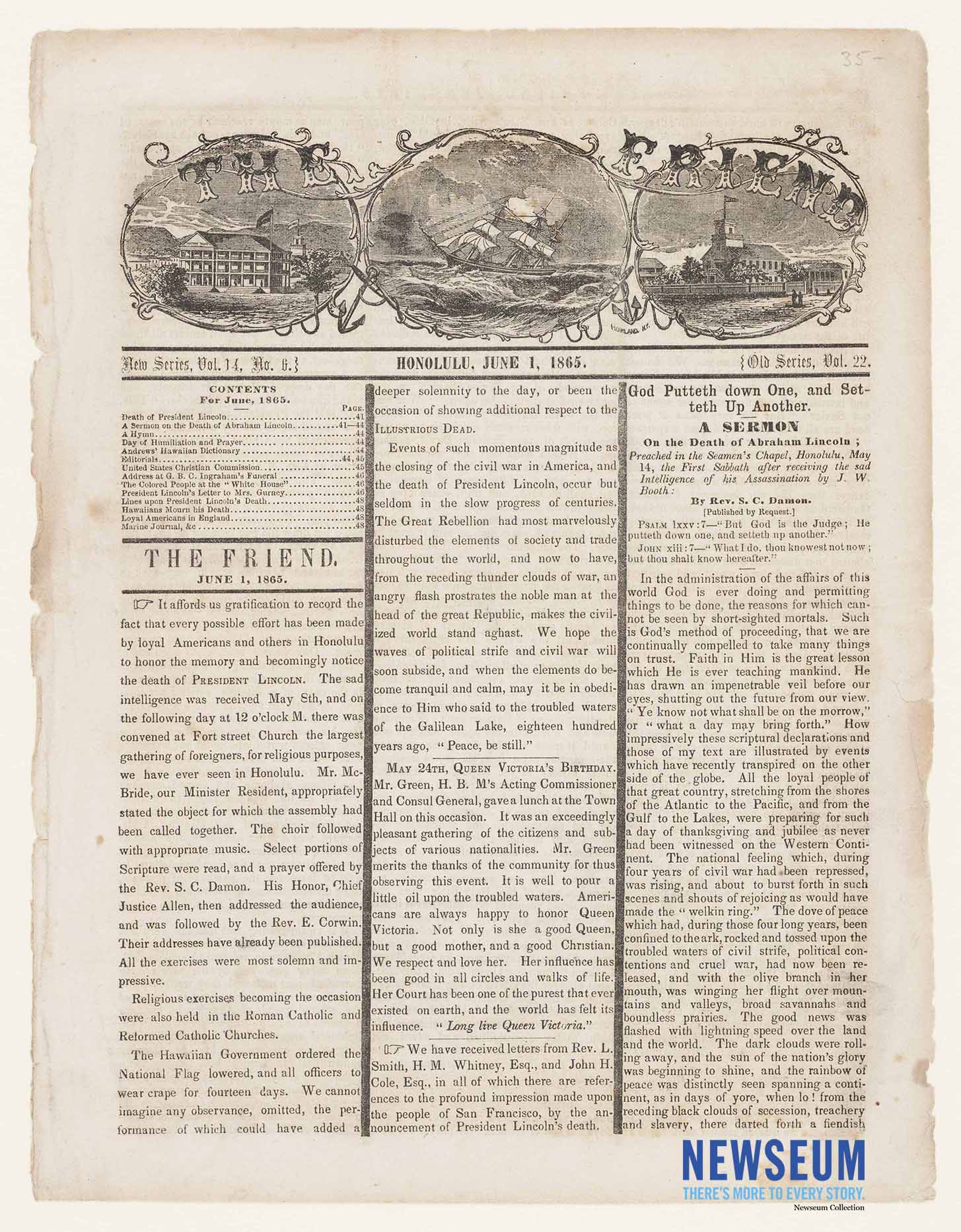
-
Description
The front page of The Friend newspaper published in Honolulu, Hawaii indicates the news of President Lincoln's assassination did not reach Hawaii until May 8, 1865. Information is provided on religious services, as well as the printing of "A Sermon on the Death of Abraham Lincoln" by Rev. S.C. Damon [Samuel Chenery Damon]. Known as "mourning rules," the wide vertical lines between the newspaper columns represent grief over the loss of an important person.
-
Source
HN-1865-010924
-
Rights
Use of this item for research, teaching, and private study is permitted with proper citation and attribution as follows: Courtesy, Newseum Collection. Reproduction of this item for publication, broadcast, or commercial use requires written permission. For permission, please contact us at artifacts@newseum.org.
-
Creator
S.C. Damon
-
Publisher
S.C. Damon
-
Date
June 1, 1865
-
Material
Newspaper
from Apr. 21, 1865
Nellie Blow to Minerva Blow
-
Full Title
Partial letter of Nellie Blow, New York, to Dearest Mother [Minerva Blow], April 21, 1865
-
Description
Regarding the prevailing gloom and sadness in the city due to the death of President Lincoln. States that Miss Haines took her out riding on the day of the funeral train. End of letter missing.
-
Source
Missouri History Museum
-
Rights
This item is in the public domain.
-
Tags
-
Cite this Item
Blow, Nellie. "Partial letter of Nellie Blow, New York, to Dearest Mother [Minerva Blow], April 21, 1865". Remembering Lincoln. Web. Accessed June 15, 2025. https://rememberinglincoln.fords.org/node/308
from Apr. 21, 1865
Partial letter of Nellie Blow, New York, to Dearest Mother [Minerva Blow], April 21, 1865
![Partial letter of Nellie Blow, New York, to Dearest Mother [Minerva Blow], April 21, 1865](https://rememberinglincoln.fords.org/sites/default/files/Nellie%20Blow%20Letter%201.jpg)
-
Description
Regarding the prevailing gloom and sadness in the city due to the death of President Lincoln. States that Miss Haines took her out riding on the day of the funeral train. End of letter missing.
-
Source
Missouri History Museum
-
Rights
This item is in the public domain.
-
Creator
Blow, Nellie
-
Date
April 21, 1865
from Apr. 25, 1865
M. J. Miller to Linda Miller
-
Full Title
Letter of M. J. Miller, In camp 12 miles south of Montgomery, Ala., to Linda, April 25 and 29, 1865
-
Description
Describes the country his regiment has traveled through on the way to Montgomery, Alabama. Comments on his dislike of stealing on the road and his avoidance of doing so with the other men in his regiment. Mentions hearing the news of the surrender of Lee to Grant and the assassination of President Lincoln. Expresses his fear that the assassination will lead to a prolonged war. Describes his eagerness to see Linda and make the acquaintance of their 10-month-old daughter, May.
-
Transcription
In camp 12 miles south of Montgomery, Ala.
Tuesday, April 25, 1865
My own Darling Linda:
I hasten to write to let you know of our safe arrival thus far. I suppose we will have an opportunity to sent mail homewards when we get to Montgomery. And you will be wanting to hear from me. If you do not hear, it shall not be my my fault. The last two weeks we have been in “the wilderness”— emphatically in “the wilderness.” Never before have we traveled thro’ such a country— so poor and so piney. The last few days the country has been some better — more populated and more civilized seemingly. The distance from where we started on Fish River is nearly 200 miles— and Greenville is the only town we saw on the way. That is a small affair 14 miles below our present camp. Fortunately we had good weather most of the time. When it did ran, it poured, and then the roads grew almost impassable. One day we could only make 5 miles in the mud, and next day only 7 miles. But altogether, we have reason to be thankful that we have got along so well and had no fighting of consequence. I have had good health, and have avoided stealing. One day Fike wanted me to go out “foraging,” and I got off by giving another man my horse to go in my stead. I got very tired walking that day, but I’ll walk all the time rather than do what I hate as I do that business. Our officers look upon me as a worthless, unsoldierly fellow, but I don’t care. They say nothing to me, but I understand. I have been hoping that this would be our last march,— have been wishing it O so much—but there is no certainty of it. We have had lots of reports, but don’t know what to believe. On the 19th, a couple officers joined us from below. They left Mobile a few days after we did, and brought the news that Lee had surrendered to Grand, and that the way was about played out. The news was communicated to the troops as they were marching along, and cheer after cheer rang along the line and every fellow felt at liberty to fire his gun. It sounded like a battle opening, and some thought it was until they heard the news. When we arrived at Greenville a couple days afterwards, Lee’s surrender being confirmed by an official dispatch brought by Gen. Grierson to Gen. Smith, 200 guns were fired in honor of the great event. We have all been feeling good over the prospect of peace at an early day. But last night we had a report that Lincoln has been assassinated. We don’t believe it, but fear it may be so, —and dread the consequences — a prolongation of the war. It can do the Rebels no good, if it is true. It will only exasperate our soldiery to such an extent that a war of extermination will be waged. Such is the opinion, at least, of some who out to know.
We expect to go into Montgomery this afternoon. I will add something to this note after we get there if I have a chance. I am very anxious to know what we are going to do—what the programme will be. We expect to have the river open from Mobile up to Montgomery and get supplies that way. Don’t know though, for certain. Some seem to think we will stop here some time, but I don’t think it will be long. I have been so hoping that I would see the war over in a few weeks. I shall be miserably disappointed if the good news we have been getting proves all untrue. It will be almost killing. Still I shall not give it up until I hear farther. I do want to hear all the real news more than I ever did anything in my life. I have been so hopeful that we would soon be together— in love and happiness at home. O how blissful even to think of! May God forbid that our hopes should prove in vain! May is now nearly 10 months old. How interesting and sweet she must be! Would and Heaven that I could see her and Talk to her and become acquainted with her so that she would love me. And I am still more anxious to see my Linda— my own darling wife. O may the Time hasten on when we shall meet “ne’er to sever.”
Saturday, April 29, 1865
We have poor encouragement to write, yet I will have a letter ready anyway. We expected to find our gunboats and transports here, when we arrived, but they have not yet made their appearance. It is reported that Dick Taylor is below here, blockading the river. All he can accomplish will not amount to much. He will injure the citizens hereabouts more than our army. As long as there is corn and meat in the country, the 16th army corps will not starve. But it’s very unpleasant to be cut off from all communication with the rest of the world. I can very anxious to hear from home— and to learn how the peace movement progresses. Here we get nothing but rumors. But the citizens begin to acknowledge that the Rebellion is a failure. That’s a symptom of some significance— especially in this heart of Rebeldom.
We camped on a creek below the city until day before yesterday morning. Then our Division marched through Montgomery with all the music and pomp it could scare up, and went into camp 2 miles north of town, in the woods, where we shall remain until we are ordered away! Montgomery is a place about the size of Belleville, though it contains a State House and some finer residences than I ever noticed in that city.
When I wrote Tuesday, I was feeling quite well, but I took cold and have been nearly sick since. Yesterday I lay in bed most of the time, and to-day I still have some fever and ashes. This is a singular time of year to be troubled with cold, but I never was nearer sick with it than I have been the last few days— not excepting that awful time at Eastport, though I do hope it will not last as long as that did. If I can only keep well, and get home and find you and May and mother well, O I shall never cease to be grateful. I shall be so glad. We shall be so happy— All of us— together at home— never again to take any more of those painful farewells. It has been a long, long time since I heard from you. You were still at Lizzie’s then. I do want a letter so much. So many things may have happened. May is 10 months old today. I do hope I shall get home by the time she is 12 months old, if not before. I think most of our officers would like to stay their three years out— to have the name of serving three years,— and their pay is increased. But if I could say so, not one day more would any of us remain in the army. I want the thing to end now, and forever. And if half the reports we have are true, the end cannot be very far off. “Let it come, I repeat, let it come!” Then if anybody should ever again attempt another Rebellion, I imagine he would be shut down on a little more promptly than Jeff. Davis and his co-traitors were, four years ago. If our boats do not get up before long, I expect part of this corps will be sent down the river to clear the way. It is certain if we remain here, we will have communication open with Mobile, or some other point. The Alabama River is a stream about like the Cumberland. If the war ends, Railroads will soon be in running order from here to Huntsville, Mobile, and Vicksburg. At present, these roads do us no good. It is unlucky for us that we are caught so far from home when peace is expected any day. But accidents will happen.
Lots of our officers and soldiers are downtown every day. I shall go when I feel better. Krafft went yesterday— Also the Col. Chaplain and others. Nearly all the business houses in town are closed! One hotel and one printing office continue to run. Confederate money is dead while we are here— and it may not be raised again if we leave. Though greenbacks might as well be dead for all the good they do us. We have 6 months due us, but no immediate prospect of being paid! No doubt it will come some day. We draw corn meal now instead of crackers. There is a large mill in Town. Excuse this “mixed” letter. Be of good cheer, dear wife. I am ever your true and devoted husband.
M. J. Miller
[Transcription by: Evan Laugen, Chandra Manning's class, Georgetown University]. -
Source
Missouri History Museum
-
Rights
This item is in the public domain.
-
Tags
-
Cite this Item
Miller, Monroe Joshua, 1830-1866. "Letter of M. J. Miller, In camp 12 miles south of Montgomery, Ala., to Linda, April 25 and 29, 1865". Remembering Lincoln. Web. Accessed June 15, 2025. https://rememberinglincoln.fords.org/node/320
from Apr. 25, 1865
Letter of M. J. Miller, In camp 12 miles south of Montgomery, Ala., to Linda, April 25 and 29, 1865

-
Description
Describes the country his regiment has traveled through on the way to Montgomery, Alabama. Comments on his dislike of stealing on the road and his avoidance of doing so with the other men in his regiment. Mentions hearing the news of the surrender of Lee to Grant and the assassination of President Lincoln. Expresses his fear that the assassination will lead to a prolonged war. Describes his eagerness to see Linda and make the acquaintance of their 10-month-old daughter, May.
-
Source
Missouri History Museum
-
Rights
This item is in the public domain.
-
Creator
Miller, Monroe Joshua, 1830-1866
-
Date
April 25, 1865
from Jun. 6, 1865
M.J. Miller to Linda Miller
-
Full Title
Letter of M. J. [Monroe Joshua Miller], Montgomery, Ala., to Linda, Lebanon, Illinois, June 6, 1865
-
Description
Mentions his disappointed in not being mustered out. Regarding the news of the President's amnesty proclamation and the news of General Lee's arrest. States that he is realizing the impact of Lincoln's death, since Lincoln never would have acted as President Johnson has done.
-
Transcription
Montgomery, Ala.,
Tuesday, June 6, 1865
My Dear Linda:
I don’t like to write when I am feeling so disappointed and mean, yet you will want to get news of some kind whether I am feeling good or bad. When I wrote the other day, we were expecting to start homewards Monday (yesterday) but Sunday afternoon word came to us that this mustering out business was suspended for the present in this Department. You may guess how we were “sot back” by this piece of news. I felt like cursing black and blue every man who had anything to do in bringing such an order about. From what we heard it seemed evident that Old Smith was the chief cause of it— he wanting to keep as large a command as possible. But now it is intimated that he wanted to give the officers a chance to receive as much of their pay, before leaving the service, as possible. Paymasters having arrived with orders to pay all troops not under orders to be mustered out, the mustering-out order was withheld from us. So they say. They say also, that so soon as we are paid, we’ll get the order to start. I’m afraid it’s not true. We will be paid tomorrow four months pay. This delay can only accommodate the officers, because always when troops are mustered out the men are paid off anyway in full; but the officers pay kept back (several months of it) until they settle up their accounts with the Government. If we are paid four months tomorrow, there will still be about that much due them when we leave the services. But that is “none of my funeral.” It only troubles me to be kept so long in the service on account of other money-grabbers. All they talk about is their money— how to get it all, &C. I get so sick hearing it. Yesterday we received the President’s amnesty proclamation, and the news of Gen’l Lee’s arrest, &c. We now begin to realize how much we lost in the death of Lincoln. He never would have acted as Johnson is doing. It is most unfortunate I think, though others here say that is the right course. I don’t believe it. The civilized would will denounce such a course. And I fear the war will break about anew, and continue for years. The proclamation pardons a few, and excepts the great majority of the Southern people. But I have no heart to talk about these troubles. We don’t get out of one until we are plunged into another. Nothing but a superhuman Power can save us from utter ruin. I think it’s dreadful that we should be so heavily afflicted by our own ambitious rulers. But excuse me for writing what will make you feel worse than you would without any letter at all. Still you know my failings, and probably can make some allowance for them. If you can be more hopeful than I am, I am glad of it. It does not help matters to lament so about them.
The Col. is detailed on a Committee to examine the officers of our Brigade— to report their characters and their wish to remain or not to remain in the service. The order appointing such a com. created considerable debate— some contending that they had no right to examine any officers but those who want to go into the Regular army. Among other warm discussions, one sprung up between the Col. and Maj. Olden. It continued until the Col. avowed himself insulted and walked off. That was yesterday morning. I don’t think they have spoken since. They were both in fault. The Col. ought to know better than to argue with such an unprincipled savage as the Major. Sic Transit egotism!
O dear me! What hot weather we have here. And so dry and dusty. It’s awful. It’s dreadful. I do long to be up and going— homewards. I am so afraid something will turn up to compel us to stay till the 19th of September. That would be almost unbearable. I want so much to see my wife and my May. I am thinking of you almost constantly and wanting O so much to be with you daily and nightly. O may that happy day soon come to us. We will then, God willing, be so happy together. Would that I could fly to you, my sweet wife, and clasp you to my heart this very day.
Ever your own true husband,
M. J. Miller
P. S. If it so turns out that we shall be kept in the army a month or two, I will send you money the first opportunity I have. Otherwise I will bring it home myself. It’s a tremendous amount anyway! It almost makes me sick when I think how much time I have thrown away.
M. J.
[Transcription by: Evan Laugen, Chandra Manning's class, Georgetown University]. -
Source
Missouri History Museum
-
Rights
This item is in the public domain.
-
Tags
-
Cite this Item
Miller, Monroe Joshua, 1830-1866. "Letter of M. J. [Monroe Joshua Miller], Montgomery, Ala., to Linda, Lebanon, Illinois, June 6, 1865". Remembering Lincoln. Web. Accessed June 15, 2025. https://rememberinglincoln.fords.org/node/321
from Jun. 6, 1865
Letter of M. J. [Monroe Joshua Miller], Montgomery, Ala., to Linda, Lebanon, Illinois, June 6, 1865
![Letter of M. J. [Monroe Joshua Miller], Montgomery, Ala., to Linda, Lebanon, Illinois, June 6, 1865](https://rememberinglincoln.fords.org/sites/default/files/145-M.J.%20Miller%20Letter%2C%20page%201.jpg)
-
Description
Mentions his disappointed in not being mustered out. Regarding the news of the President's amnesty proclamation and the news of General Lee's arrest. States that he is realizing the impact of Lincoln's death, since Lincoln never would have acted as President Johnson has done.
-
Source
Missouri History Museum
-
Rights
This item is in the public domain.
-
Creator
Miller, Monroe Joshua, 1830-1866
-
Date
June 6, 1865
from Apr. 17, 1865
General Orders, No. 69
-
Full Title
General Orders, No. 69, War Department, Adjutant General's Office, Washington, April 17, 1865
-
Description
Gives notice of the closing of the War Department on the day of the funeral of the late President and the suspension of labor at all military posts and all public works under the direction of the War Department, and orders flags to be flown at half-staff.
-
Source
Missouri History Museum
-
Rights
This item is in the public domain.
-
Tags
-
Cite this Item
Nichols, W. A.. "General Orders, No. 69, War Department, Adjutant General's Office, Washington, April 17, 1865". United States. War Department. Remembering Lincoln. Web. Accessed June 15, 2025. https://rememberinglincoln.fords.org/node/324
from Apr. 17, 1865
General Orders, No. 69, War Department, Adjutant General's Office, Washington, April 17, 1865
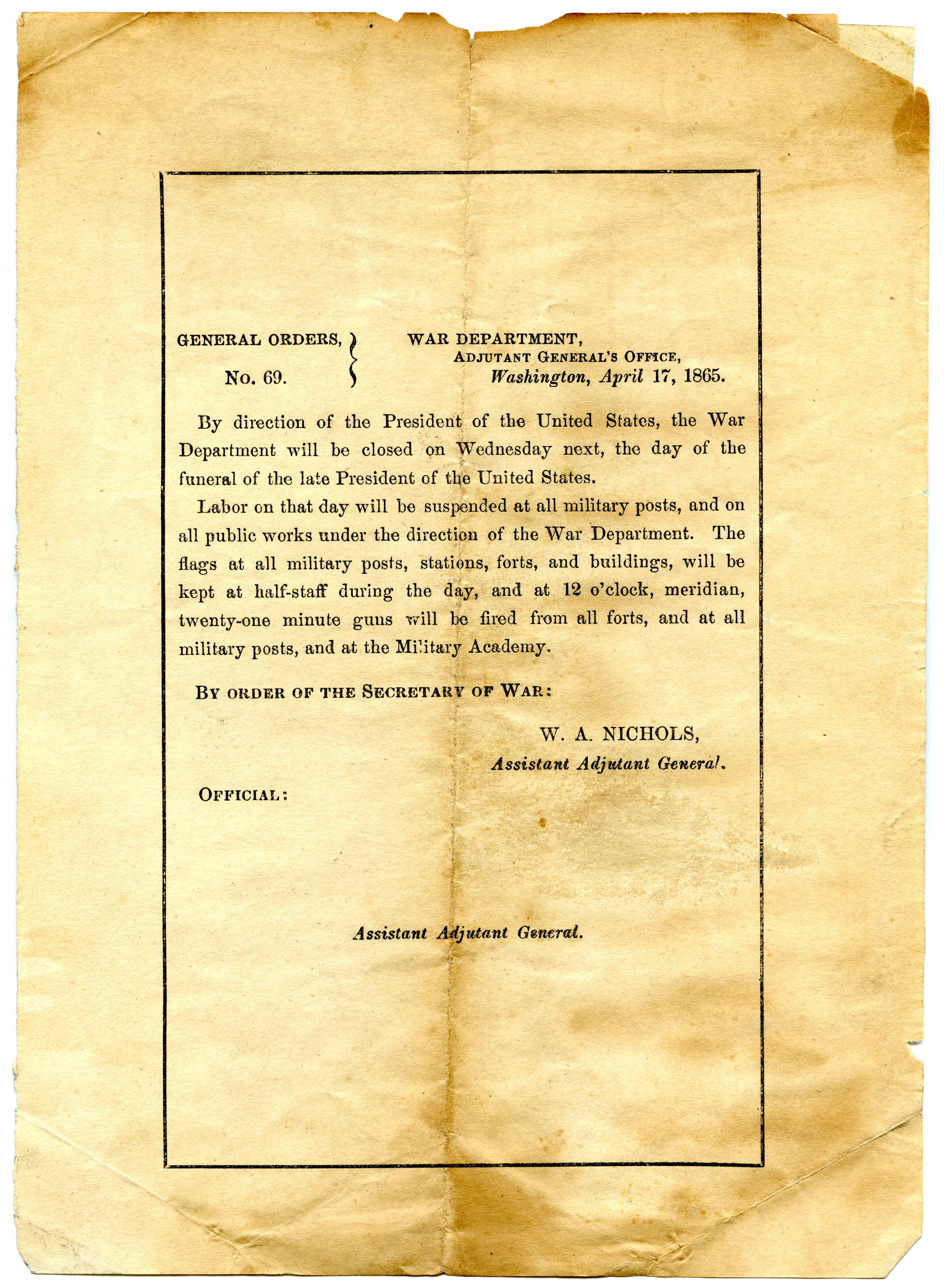
-
Description
Gives notice of the closing of the War Department on the day of the funeral of the late President and the suspension of labor at all military posts and all public works under the direction of the War Department, and orders flags to be flown at half-staff.
-
Source
Missouri History Museum
-
Rights
This item is in the public domain.
-
Creator
Nichols, W. A.
-
Publisher
United States. War Department
-
Date
April 17, 1865
from May. 1, 1865
Dedicated to the Memory of Abraham Lincoln
-
Full Title
Dedicated to the Memory of Abraham Lincoln...America's noblest sons are weeping
-
Description
Broadside reading "Dedicated to the Memory of Abraham Lincoln" including 8 lines of poetry beginning "America's noblest sons are weeping" copyright James Logan [Philadelphia].
-
Transcription
DEDICATED
TO THE
MEMORY OF
ABRAHAM LINCOLN
America’s noblest sons are weeping
Her daughters they are bathed in tears;
Abraham the Great has fallen---in
Nature’s sleep, the sleep of years.
Now he’s gone, we’ll not recall him
From a paradise of bliss----
Where he pleads the cause of Freedom
To a changing world like this.
Entered to Act of Congress in the year 1865 by James Logan, in the Clerk’s Office of the District Court for the Eastern District of Pennsylvania.
[Transcription by: Dr. Susan Corbesero, Ellis School, Pittsburgh, Pennsylvania] -
Source
Kislak Center for Special Collections, Rare Books and Manuscripts, University of Pennsylvania Libraries. Gordon Block Collection of Lincolniana, UPenn Ms. Coll. 941, Box 4 Folder 1
-
Rights
This item is in the Public Domain.
-
Tags
-
Cite this Item
Logan, James. "Dedicated to the Memory of Abraham Lincoln...America's noblest sons are weeping". Remembering Lincoln. Web. Accessed June 15, 2025. https://rememberinglincoln.fords.org/node/294
-
Creator
Logan, James
-
Date
1865
from May. 1, 1865
Dedicated to the Memory of Abraham Lincoln...America's noblest sons are weeping
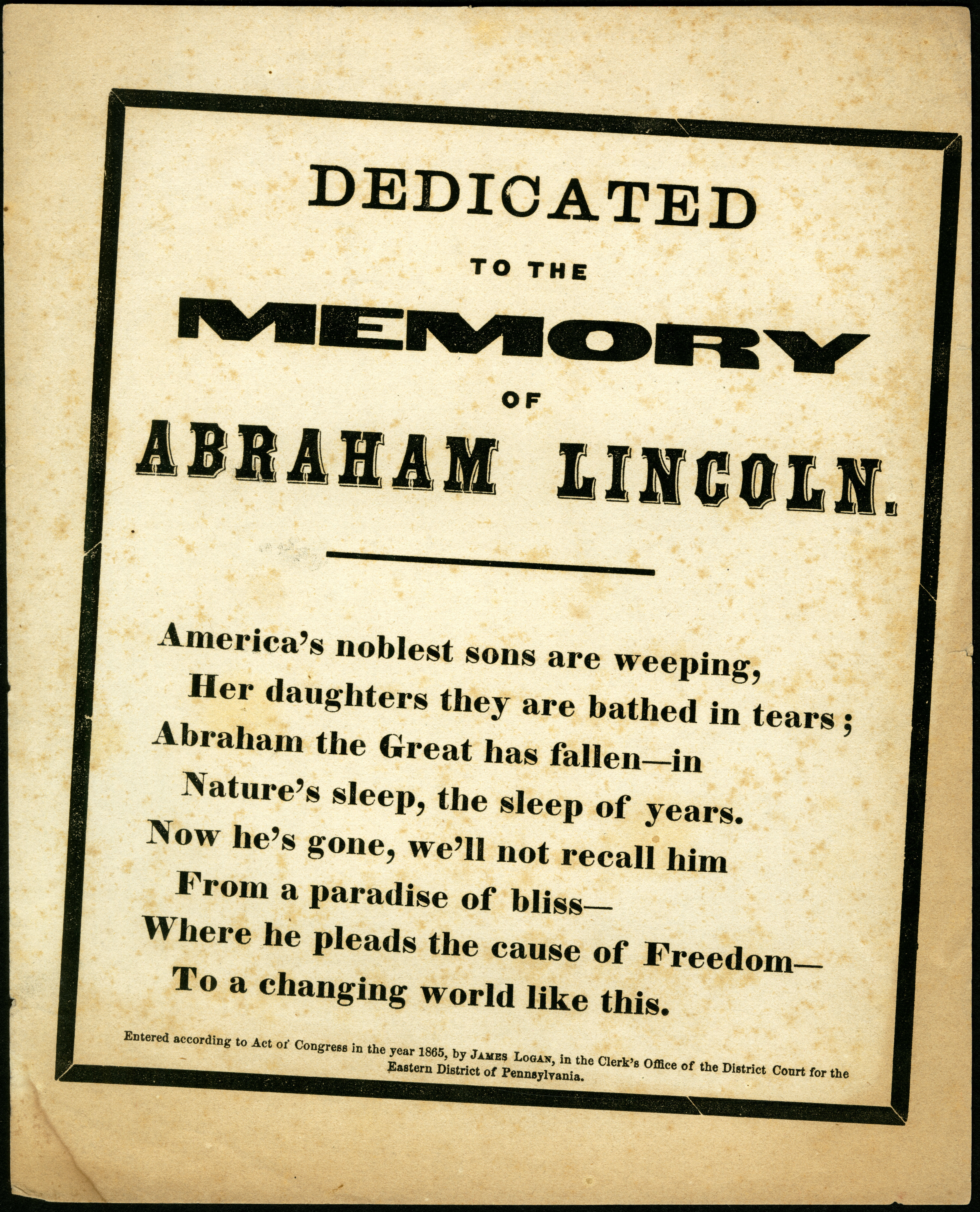
-
Description
Broadside reading "Dedicated to the Memory of Abraham Lincoln" including 8 lines of poetry beginning "America's noblest sons are weeping" copyright James Logan [Philadelphia].
-
Source
Kislak Center for Special Collections, Rare Books and Manuscripts, University of Pennsylvania Libraries. Gordon Block Collection of Lincolniana, UPenn Ms. Coll. 941, Box 4 Folder 1
-
Rights
This item is in the Public Domain.
-
Creator
Logan, James
-
Date
May 1, 1865
from Apr. 15, 1865
Telegram of J. B. Montgomery
-
Full Title
Contemporary copy of telegram of J. B. Montgomery, Navy Yard, Washington, D.C., to Joseph Smith, Rear Admiral, Chief of Bureau Yards, Navy Department, April 15, 1865
-
Description
Inquires if the yard bell should be rung on Monday morning [for Abraham Lincoln's funeral service].
-
Source
Missouri History Museum
-
Rights
This item is in the public domain.
-
Tags
-
Cite this Item
Montgomery, John Berrien, 1794-. "Contemporary copy of telegram of J. B. Montgomery, Navy Yard, Washington, D.C., to Joseph Smith, Rear Admiral, Chief of Bureau Yards, Navy Department, April 15, 1865". Remembering Lincoln. Web. Accessed June 15, 2025. https://rememberinglincoln.fords.org/node/325
from Apr. 15, 1865
Contemporary copy of telegram of J. B. Montgomery, Navy Yard, Washington, D.C., to Joseph Smith, Rear Admiral, Chief of Bureau Yards, Navy Department, April 15, 1865
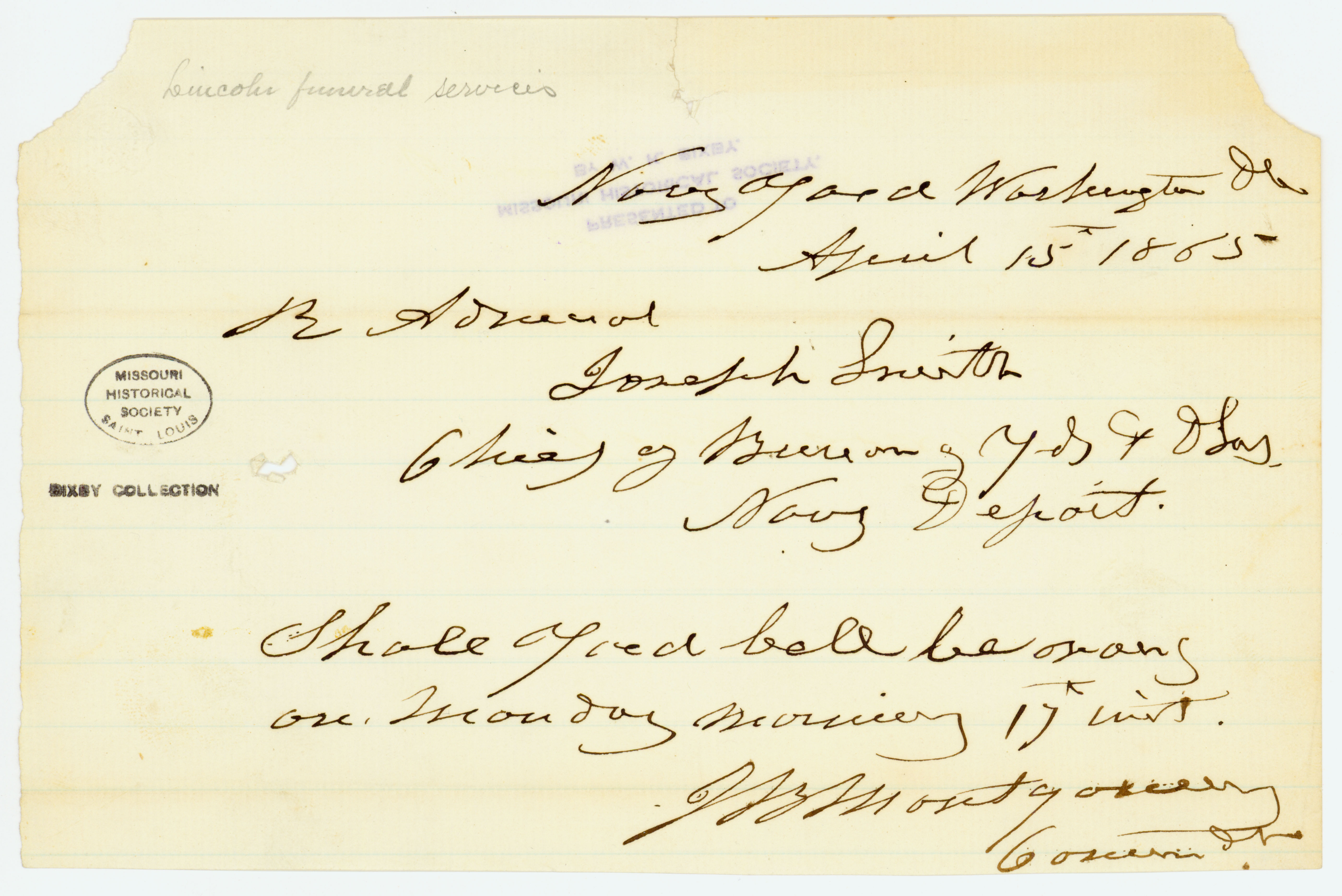
-
Description
Inquires if the yard bell should be rung on Monday morning [for Abraham Lincoln's funeral service].
-
Source
Missouri History Museum
-
Rights
This item is in the public domain.
-
Creator
Montgomery, John Berrien, 1794-
-
Date
April 15, 1865
from Apr. 16, 1865
Telegraph: Fire a Gun in Honor
-
Full Title
United States Military Telegraph of Gideon Welles, Sec. Navy, St. Inigoes, to Com. F. A. Parker, April 16, 1864 [1865]
-
Description
States, "On Monday fire a gun in honor of the late President each half hour, from sunrise to sunset. Keep All flags at half-mast until after the funeral. Officers will wear crape. General order by Mail. . . ."
-
Source
Missouri History Museum
-
Rights
This item is in the public domain.
-
Tags
-
Cite this Item
Welles, Gideon, 1802-1878. "United States Military Telegraph of Gideon Welles, Sec. Navy, St. Inigoes, to Com. F. A. Parker, April 16, 1864 [1865]". Remembering Lincoln. Web. Accessed June 15, 2025. https://rememberinglincoln.fords.org/node/346
from Apr. 16, 1865
United States Military Telegraph of Gideon Welles, Sec. Navy, St. Inigoes, to Com. F. A. Parker, April 16, 1864 [1865]
![United States Military Telegraph of Gideon Welles, Sec. Navy, St. Inigoes, to Com. F. A. Parker, April 16, 1864 [1865]](https://rememberinglincoln.fords.org/sites/default/files/170-Gideon%20Welles%20Telegram%2C%20page%201.jpg)
-
Description
States, "On Monday fire a gun in honor of the late President each half hour, from sunrise to sunset. Keep All flags at half-mast until after the funeral. Officers will wear crape. General order by Mail. . . ."
-
Source
Missouri History Museum
-
Rights
This item is in the public domain.
-
Creator
Welles, Gideon, 1802-1878
-
Date
April 16, 1865
from Apr. 17, 1865
Telegram of Gideon Welles
-
Full Title
Contemporary copy of telegram of Gideon Welles, Secy. of the Navy, Navy Department, Washington, to Comdr. D. W. Dougal, Comdt. Navy Yard, San Francisco, California, April 17, 1865
-
Description
States, "On Wednesday next, the day of funeral of President, suspect work in Yard and on vessels, keep flags at half mast and fire twenty-one minute guns at Meridian. . . ."
-
Source
Missouri History Museum
-
Rights
This item is in the public domain.
-
Tags
-
Cite this Item
Welles, Gideon, 1802-1878. "Contemporary copy of telegram of Gideon Welles, Secy. of the Navy, Navy Department, Washington, to Comdr. D. W. Dougal, Comdt. Navy Yard, San Francisco, California, April 17, 1865". Remembering Lincoln. Web. Accessed June 15, 2025. https://rememberinglincoln.fords.org/node/347
from Apr. 17, 1865
Contemporary copy of telegram of Gideon Welles, Secy. of the Navy, Navy Department, Washington, to Comdr. D. W. Dougal, Comdt. Navy Yard, San Francisco, California, April 17, 1865

-
Description
States, "On Wednesday next, the day of funeral of President, suspect work in Yard and on vessels, keep flags at half mast and fire twenty-one minute guns at Meridian. . . ."
-
Source
Missouri History Museum
-
Rights
This item is in the public domain.
-
Creator
Welles, Gideon, 1802-1878
-
Date
April 17, 1865

